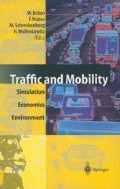Abstract
The theory and use of the Path Flow Estimator (PFE) as a one-stage network observer in support of urban traffic management and control is presented. Following an outline of the theory, initial results from the CLEOPATRA and COSMOS projects are reported. Underlying the PFE is a flexible capacitated stochastic user equilibrium traffic assignment method which provides unique estimates of path flows and path travel times from traffic count and prior origindestination data. To accommodate transitory overloading, time-dependent delay functions are used whereby final queues in one time slice are passed forward as initial queues for the next. The PFE is programmed in C, and can run on a variety of platforms. Efficient use of memory means that large networks can be handled in real time on a PC, although the algorithm stores and processes individual paths.
Access this chapter
Tax calculation will be finalised at checkout
Purchases are for personal use only
Preview
Unable to display preview. Download preview PDF.
References
M.G.H. Bell and C.M. Shield, C.M., A log-linear model for path flow estimation. Proceedings of the Fourth International Conference on the Applications of Advanced Technologies in Transportation Engineering, Capri, 695–9, 1995.
M.G.H. Bell, W.H.K. Lam, and Y. Lida, A time-dependent multiclass path flow estimator. Proceedings of the 13th International Symposium on Transportation and Traffic Theory, Lyon, France, 1996.
D. Van Vliet, SATURN–A modern assignment model. Traffic Engineering & Control, Vol. 23, 578–581, 1982.
D.R. Leonard, J.B. Tough, and P.C. Baguley, CONTRAM - A traffic assignment model for predicting flows and queues during peak periods. TRRL Laboratory Report LR841, 1978.
R. Kimber and E.M. Hollis, Traffic queues and delays at road junctions. TRRL Laboratory Report LR909, 1979.
M.G.H. Bell, C.M. Shield, J-J. Henry, and L. Breheret, A stochastic user equilibrium (SUE) path flow estimator for the DEDALE database in Lyon. Advanced Methods in Transportation Analysis (L. Bianco and P. Toth, Eds), Springer-Verlag, Berlin, Heidelberg, 75–92, 1996.
CLEOPATRA Project TR1012, Deliverable D4: Final Report on Specification. DGXIJI European Commission, September 1997.
L. Breheret, F. Schettini and M.G.H. Bell, CLEOPATRA Project: Application of traffic monitoring to City of Lyon. 4th World Congress on Intelligent Transport Systems, Berlin, 1997.
COSMOS Project TR1015, Deliverable D03.3: Integrated UTC Strategies for Congestion and Incident Management. DGXIII European Commission, October 1997.
Author information
Authors and Affiliations
Editor information
Editors and Affiliations
Rights and permissions
Copyright information
© 1999 Springer-Verlag Berlin Heidelberg
About this paper
Cite this paper
Bell, M.G.H., Grosso, S. (1999). Estimating Path Flows from Traffic Counts. In: Brilon, W., Huber, F., Schreckenberg, M., Wallentowitz, H. (eds) Traffic and Mobility. Springer, Berlin, Heidelberg. https://doi.org/10.1007/978-3-642-60236-8_6
Download citation
DOI: https://doi.org/10.1007/978-3-642-60236-8_6
Publisher Name: Springer, Berlin, Heidelberg
Print ISBN: 978-3-642-64316-3
Online ISBN: 978-3-642-60236-8
eBook Packages: Springer Book Archive

